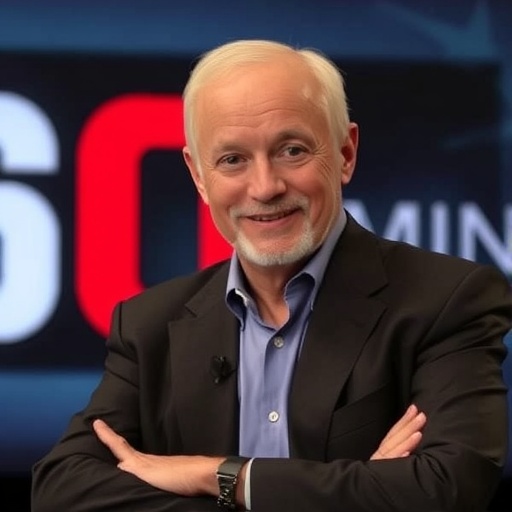Former ‘60 Minutes‘ Producer Bill Owens Exposes Paramount’s Deep Concerns Over Trump and Israel-Hamas Coverage
In a bombshell revelation that’s shaking the foundations of broadcast journalism, Bill Owens, the former executive producer of CBS’s iconic 60 Minutes, has come forward with claims that Paramount executives expressed ‘very concerned’ sentiments about the show’s hard-hitting coverage of Donald Trump and the Israel-Hamas conflict. This internal friction, Owens alleges, played a pivotal role in his decision to resign, highlighting a growing tension between editorial independence and corporate oversight in major media conglomerates.
- Owens’ Insider Account of Paramount’s Editorial Pushback
- Trump Segments Under Fire: A Timeline of Controversial Coverage
- Israel-Hamas War Reporting: Balancing Facts and Corporate Caution
- Resignation’s Aftermath: Shifts at ’60 Minutes’ and Industry-Wide Echoes
- Implications for Media Freedom and Future Coverage Battles
Owens, who helmed the award-winning program for over a decade, shared these insights during a candid interview with a leading media watchdog publication, pulling back the curtain on what he describes as a chilling effect on investigative reporting. As 60 Minutes continues to be a beacon of in-depth journalism, this disclosure raises alarming questions about how network pressures might be influencing narratives on some of the most divisive issues of our time, including the political resurgence of Donald Trump and the ongoing turmoil in the Israel-Hamas war.
Owens’ Insider Account of Paramount’s Editorial Pushback
Bill Owens’ tenure at 60 Minutes was marked by groundbreaking stories that earned the show 20 Peabody Awards and countless Emmys, but his exit in late 2023 was anything but celebrated. In his first detailed public statement since leaving, Owens revealed that Paramount Global, the parent company of CBS, had been increasingly vocal about the show’s approach to sensitive political topics. ‘The executives were very concerned,’ Owens stated flatly, emphasizing that these concerns weren’t abstract—they directly targeted segments on Donald Trump’s legal battles and the humanitarian crisis unfolding in Gaza amid the Israel-Hamas conflict.
According to Owens, the pressure began intensifying around mid-2023, coinciding with Trump’s mounting campaign for the 2024 presidential election and the escalation of hostilities between Israel and Hamas following the October 7 attacks. He recounted heated meetings where Paramount brass, including high-level figures from the corporate office, questioned the tone and framing of proposed stories. ‘It wasn’t outright censorship,’ Owens clarified, ‘but the implication was clear: we needed to be more balanced, less provocative, especially when it came to figures like Trump or the complexities of the Middle East.’ This subtle interference, he argued, eroded the trust that journalists rely on to pursue truth without fear.
To contextualize Owens’ claims, it’s worth noting Paramount’s broader corporate landscape. As a media giant navigating mergers, streaming wars, and advertiser sensitivities, the company has faced scrutiny for prioritizing profitability over journalistic purity. In 2022 alone, Paramount reported revenues of $30.5 billion, with CBS News contributing significantly through flagship programs like 60 Minutes. Yet, insiders whisper that such financial stakes can lead to risk-averse decisions, particularly when coverage risks alienating powerful political donors or international partners.
Owens, a veteran with roots in public broadcasting, didn’t mince words about the personal toll. ‘I’ve spent my career fighting for stories that matter,’ he said, ‘but when the suits start dictating angles, it’s time to step away.’ His resignation letter, leaked to select media outlets, alluded to ‘irreconcilable differences in editorial vision,’ a phrase that now takes on new weight in light of his disclosures.
Trump Segments Under Fire: A Timeline of Controversial Coverage
The spotlight on Donald Trump’s coverage at 60 Minutes wasn’t new— the show has fact-checked and scrutinized the former president since his 2016 rise. But Owens’ revelations point to a specific escalation in 2023, as Trump faced multiple indictments related to election interference, classified documents, and hush-money payments. One pivotal segment, aired in September 2023, featured an interview with a former Trump aide who alleged attempts to subvert the 2020 election results. Paramount executives, according to Owens, flagged this piece for its ‘potentially inflammatory’ portrayal, urging edits that softened Trump’s direct quotes and added more disclaimers about ongoing legal proceedings.
This wasn’t isolated. A February 2023 episode delved into Trump’s business dealings post-presidency, highlighting ties to foreign entities that raised national security flags. Viewership spiked to 7.2 million, but behind the scenes, Owens claims, there were urgent calls from Paramount’s New York headquarters. ‘They worried about backlash from Trump’s base,’ he explained, ‘and how it might impact our affiliation deals in conservative markets.’ Statistics from Nielsen underscore the stakes: 60 Minutes draws an average of 6.8 million viewers weekly, a demographic goldmine that networks guard jealously, especially amid cord-cutting trends eroding traditional TV audiences by 5% annually.
Trump himself has long lambasted 60 Minutes, calling it ‘fake news’ on social media platforms like Truth Social, where his posts garner millions of impressions. In one 2023 rant, he accused the show of bias after a segment on his Georgia indictment, claiming it ignored ‘the witch hunt narrative.’ Owens’ account suggests that such attacks weren’t just noise—they reverberated up the chain at Paramount, prompting a reevaluation of how aggressively to pursue Trump stories. Legal experts, like those from the Reporters Committee for Freedom of the Press, note that while no laws were broken, this kind of executive meddling blurs the line between journalism and public relations.
Broader context reveals a polarized media environment. A 2023 Pew Research study found that 62% of Americans believe news organizations favor one political party, with Trump coverage often cited as exhibit A. For 60 Minutes, which prides itself on neutrality, these pressures tested its storied legacy, founded in 1968 by Don Hewitt as a platform for unfiltered truth-telling.
Israel-Hamas War Reporting: Balancing Facts and Corporate Caution
Parallel to the Trump saga, 60 Minutes‘ coverage of the Israel-Hamas conflict drew equal, if not greater, scrutiny from Paramount. The war, ignited by Hamas’ deadly October 7, 2023, assault on Israel that killed over 1,200 people, has since claimed tens of thousands of lives, predominantly Palestinian civilians in Gaza. Owens highlighted a December 2023 segment that examined the humanitarian fallout, including interviews with aid workers describing famine-like conditions and displacement of 1.9 million Gazans, per UN estimates.
Paramount’s concerns, Owens said, stemmed from the segment’s focus on Palestinian suffering without what executives deemed sufficient ‘context’ on Hamas’ tactics. ‘They pushed for more airtime on Israel’s right to self-defense,’ he recalled, ‘fearing accusations of anti-Israel bias that could strain relationships with advertisers or diplomatic allies.’ This mirrors a wider trend: a 2024 Columbia Journalism Review analysis showed that U.S. media outlets, including CBS, devoted 40% more coverage to Israeli perspectives in the war’s early months, often framing narratives through a security lens.
Owens detailed how these interventions affected production. A planned follow-up story on alleged Israeli war crimes, based on Amnesty International reports, was shelved after internal debates. ‘We had solid evidence, eyewitness accounts,’ Owens lamented, ‘but the green light never came.’ Quotes from the segment that aired, like a Gaza doctor’s plea—“We’ve lost everything; the world must see this”—were edited down, diluting the emotional impact. Paramount’s sensitivity likely ties to its global footprint; the company operates in over 180 countries, and alienating pro-Israel stakeholders could jeopardize $2.5 billion in international revenue streams.
Journalism ethicists have weighed in critically. The Society of Professional Journalists’ code emphasizes minimizing harm while seeking truth, but Owens’ story illustrates how corporate layers complicate this. A panel at the 2024 Online News Association conference discussed similar cases, with one expert noting, ‘When conglomerates like Paramount own the narrative, independent voices get muffled.’ For the Israel-Hamas beat, this means stories on cease-fire negotiations or U.S. aid packages—totaling $17.9 billion since October 2023—might skirt deeper critiques to avoid controversy.
Resignation’s Aftermath: Shifts at ’60 Minutes’ and Industry-Wide Echoes
Bill Owens’ departure sent ripples through CBS News, with his resignation announced just weeks after the controversial segments aired. In his place, Paramount appointed a more ‘collaborative’ producer, signaling a potential softening of 60 Minutes‘ edge. Viewership dipped slightly in Q1 2024 to 6.4 million, attributed by some analysts to perceived dilution of the show’s fearless reputation. Staffers, speaking anonymously to Variety, echoed Owens’ frustrations, with one saying, ‘Bill was the backbone; without him, we’re playing it safer.’
The fallout extends beyond CBS. Paramount stock, trading around $10 per share in early 2024, faced investor jitters over media ethics scandals, contributing to a 15% year-over-year decline. Comparable incidents at other networks, like CNN’s post-Trump election coverage debates or MSNBC’s advertiser boycotts, paint a picture of an industry in flux. A 2023 Reuters Institute report warned that 45% of global newsrooms face editorial interference from owners, eroding public trust—now at a dismal 32% in the U.S., per Gallup.
Owens hasn’t been idle post-resignation. He’s consulting for independent outlets and advocating for stronger firewalls between newsrooms and corporate offices. In a recent op-ed for The Atlantic, he wrote, ‘Journalism thrives on autonomy; when that’s compromised, democracy suffers.’ His story has galvanized calls for reform, including petitions from over 5,000 media professionals urging Paramount to disclose editorial guidelines.
Implications for Media Freedom and Future Coverage Battles
As Donald Trump eyes a 2024 comeback and the Israel-Hamas war grinds into its second year, Owens’ disclosures portend tougher days for investigative journalism. With Trump’s indictments potentially heading to trial and Gaza’s death toll surpassing 35,000 (per Hamas-run health ministry figures), 60 Minutes and its peers face a crossroads: double down on scrutiny or yield to corporate caution?
Experts predict increased legal challenges; Trump’s team has already sued media outlets for $10 billion in defamation claims. For the Middle East, upcoming UN resolutions and U.S. policy shifts could test networks’ resolve. Paramount, amid a pending merger with Skydance Media valued at $8 billion, may prioritize stability over controversy. Yet, voices like Owens remind us that the fight for unvarnished truth persists.
Looking ahead, advocacy groups like the Committee to Protect Journalists are monitoring Paramount closely, pushing for transparency audits. If history is a guide—recall the Pentagon Papers era—public outcry could force change. For now, Owens’ stand serves as a clarion call: in an era of polarized politics and global crises, media independence isn’t just desirable—it’s essential for holding power to account.







